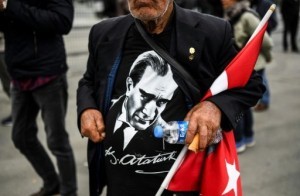Turkish authorities on Thursday issued arrest warrants for two historians accused of insulting the memory of Turkey’s modern founder Mustafa Kemal Ataturk in a televised debate and social media.
A court in the Istanbul district of Bakirkoy approved a prosecutors’ request for the arrest warrants targeting Suleyman Yesilyurt and Hasan Akar for “insulting the memory of Ataturk” and “inciting hatred and enmity”, the state-run Anadolu news agency said.
In a television history show on the Tvnet channel last week, Yesilyurt had claimed that Ataturk’s adopted daughter Afet Inan had in reality been his mistress.
Inan, a historian who died in 1985, was one of several daughters adopted by Ataturk including the fighter pilot Sabiha Gokcen.
Ataturk — who was married once from 1923-1925 to Latife Ussaki — had no biological children but is regarded by admirers as the father of the modern Turkish nation.
Meanwhile, Akar had claimed on social media that Ataturk’s mother Zubeyde Hanim had worked in a brothel and further claimed that he was an illegitimate child.
The unsubstantiated claims were met with outrage by pro-Ataturk associations and prosecutors immediately opened an investigation.
Prime Minister Binali Yildirim had on Wednesday strongly condemned the comments and called for a probe.
Reports said the two suspects have not been found at their addresses.
And Tvnet was fined five percent of its advertising revenue by the the Radio and Television Supreme Council (RTUK).
Critics have accused President Recep Tayyip Erdogan of undermining the secular foundations of the Turkish Republic set up by Ataturk in 1923 amid the ruins of the Ottoman Empire.
But Erdogan and the ruling Justice and Development Party (AKP) say they are simply continuing Ataturk’s determination to create stable government and a strong Turkey respected around the world.
It is illegal in Turkey to denigrate the memory of Ataturk, who remains an icon for many Turks after his death in 1938.
However, criminal cases for insulting top state officials, including Erdogan, have in recent years become much more common.
Ask me anything
Explore related questions





